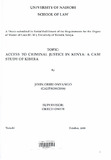| dc.description.abstract | Access to justice for the poor has been elusive in many respects. Existing dispute
resolution mechanisms and structures in Africa were imposed upon the people
through colonialism. The legal profession in East Africa for example is an alien
institution far removed from the lives of ordinary people. Courts of law are still
inaccessible to many. The language of the law is technical and almost archaic.
These factors coupled with rampant poverty and the culture of political
intolerance and corruption, combine to make justice an extremely rare commodity
for the majority of the people. It is not surprising therefore that one of the main
issues that cries for constitutional recognition is the manner in which justice is
dispensed ... The road to justice for the poor is riddled with systemic biases and
non-systemic constraints. 1
1.1. Background to the study
Access to justice broadly refers to the ability of persons to have their
grievances addressed in court in a fair, rational and cheap manner.
Primarily, the concept of access to justice is, however, broader than
the ability to access courts of law. The former encompasses the latter. | en |

